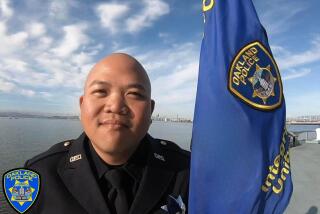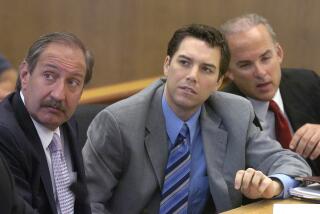For Dallies’ Family, a New Nightmare
- Share via
As Garden Grove police met with prosecutors Friday in a last-ditch effort to persuade them to change course, relatives of slain police officer Howard E. Dallies Jr. struggled with the possibility that the man accused of killing the father of two might soon be released.
For friends and family members such as Chuck Weaver, the four-year wait for an arrest in the 1993 killing proved excruciating.
But nothing, Weaver said, matches the prospect that the murder charges filed against John J.C. Stephens might be dropped, perhaps as soon as Monday.
Weaver, who assumed the role of Dallies’ uncle when Weaver’s sister-in-law married the then-3-year-old boy’s father, said he heard through other family members Thursday that the charges against Stephens could be dismissed.
Citing insufficient evidence, prosecutors told police at a Wednesday meeting that they intended to seek a dismissal of the charges against Stephens, who has spent two years in county jail awaiting trial, officials said.
“It’s really discouraging to us,” Weaver said. “We were so much in fear that they wouldn’t catch the killer, so when they arrested someone it just brought us back to life again.” The likelihood that Stephens may soon be released is “really heartbreaking,” he said.
Other than to say that nothing had been decided, police and district attorney’s officials declined to comment on what transpired at Friday’s meeting, which lasted through the morning and entire afternoon.
“Everything’s still up in the air,” said Garden Grove Police Capt. Dave Abrecht. Police have said they hope prosecutors will keep the case against the Buena Park suspect alive.
If prosecutors follow through on their earlier intentions and drop the case, family members may never know whether Stephens is indeed Dallies’ killer, or an innocent man charged with a crime he never committed and kept unnecessarily in jail for two years.
After six years of intensive investigations, police maintain they have the right man, although prosecutors have told them they don’t have the evidence to prove it. At first, investigators had little to go on beyond a witness who saw only the killer’s back and Dallies’ dying words, which described the killer as “white, male, young.”
Police honed in on Stephens after ballistics tests revealed that the weapon that killed Dallies was the same handgun used in an attack three months earlier that seriously wounded a Santa Ana security guard.
Police said they were led to Stephens because he bears a strong resemblance to the man pictured in a composite sketch prepared by Santa Ana police investigating the shooting of the security guard.
Stephens was serving a seven-year sentence in a California prison for burglary when he was charged with the killing of Dallies in July 1997.
Police believe Dallies’ killer, who fled the scene on a motorcycle, was driving a gray Kawasaki that was abandoned not far from the murder scene shortly after the slaying.
But Stephens, who according to court records admitted to police that he regularly stole motorcycles for $500 a pop, denied he had anything to do with the murder.
Stephens’ girlfriend initially told police that he was with her the night of the killing, providing him a strong alibi. But under police interrogation she recanted, telling them that Stephens came home frantic a few hours after the shooting and dyed his sandy blond hair black, according to court documents.
According to a police affidavit in the court file, four other people also implicated Stephens in the slaying.
But the case against Stephens was based largely on circumstantial evidence. Police never found the murder weapon, and there was no forensic evidence or witness accounts linking Stephens with the murder, officials said. Indeed, the maimed security guard, faced with a photo of Stephens, did not pick him as the shooter, court records show.
Moreover, some of the people who had implicated Stephens have unsavory backgrounds, according to police and Stephens’ defense attorney, who added that some were already retracting the statements they had given to investigators.
With the case’s outcome far from certain, prosecutors would be running the risk of Stephens winning an acquittal if they went to trial. If Stephens were acquitted of Dallies’ murder, the constitutional guarantee against double jeopardy would prevent prosecutors from ever filing charges against him in the future.
By dropping the case now, before it goes to trial, legal experts said prosecutors would preserve their ability to refile murder charges against Stephens if additional evidence is unearthed.
But that prospect doesn’t satisfy Dallies’ relatives, who have hoped that a conviction might bring some closure to the violent death of their loved one.
“The main concern now is that we get the guy” who killed him--whether Stephens or not--”and make him pay,” Weaver said.
More to Read
Sign up for Essential California
The most important California stories and recommendations in your inbox every morning.
You may occasionally receive promotional content from the Los Angeles Times.










